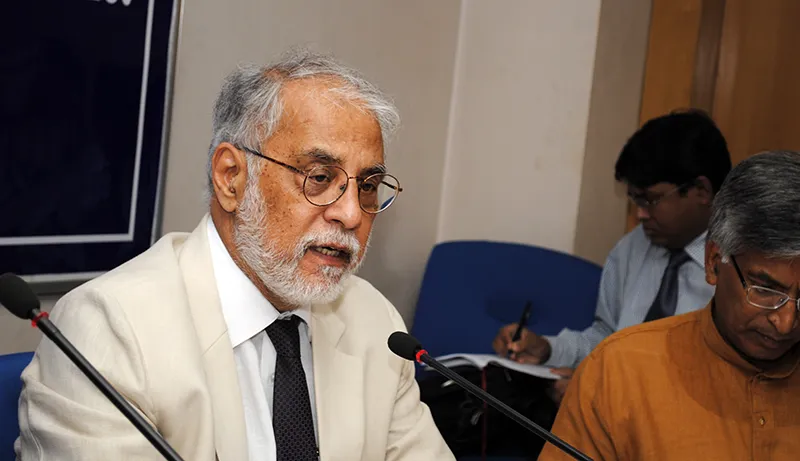India and Pakistan need to begin a dialogue on economic and military relations. It will be a challenge for both countries to balance the provision of security for its populations with the need to create the enabling environment for economic and social development and growth.

India and Pakistan need to shift the trajectory of military spending and turn toward greater confidence building as it is clear that increased spending has not brought foolproof security to either country, according to economic expert Mr Mohan Guruswamy.
Making a presentation after the release of an Atlantic Council report titled ’India and Pakistan: The Opportunity Cost of Conflict’ at Observer Research Foundation on June 24, 2014, Mr Guruswamy, one of the authors of the report and a Visiting Fellow, ORF, said there should be increased people-to-people contacts and old stereotypes that fuel fears should be eliminated.
He also suggested that there should be direct communication between the militaries of the two countries as well as more transparency about their military plans and movements. The two countries should jointly invest in energy, water and export industries, and borders should be opened for trade.
The other author, Mr. Shuja Nawaz, Director of the South Asia Center, Atlantic Council, also presented his views on the issue. The presentations focused on bilateral trade as well as military spending on both sides of the border.
The discussion was chaired by Dr. Manoj Joshi, Distinguished Fellow, Observer Research Foundation. He said that India and Pakistan can take several steps to build confidence and trust on both sides of the border that would lay the foundation for greater economic cooperation.
Talking about military spending on both sides of the border, Mr Mohan Guruswamy gave a detailed account of how spending on defence in both countries was rising in real terms, especially during the period 1998-2010, but was actually declining in terms of the GDPs of both countries.
Mr Mohan Guruswamy concentrated on the term "self-interest", stating that militaries should not be a factor stopping the business and trade between the two countries. He pointed out that there is a need to begin a dialogue on economic and military relations between the two countries and that it will be a challenge for both countries to balance the provision of security for its populations with the need to create the enabling environment for economic and social development and growth.
Mr. Shuja Nawaz made a case for increasing trade, emphasising that the trade between the two countries is beginning to dwindle. Direct trade between the two nations is relatively small. The total trade between Pakistan and India in 2011 was $2.6 billion. In 2010, India exported about $2 billion to Pakistan and imported about $300 million. Indirect trade, however, is much greater, but very difficult to quantify. He further argued that Pakistan can benefit a lot through Indian investment, especially in the area of agriculture, and this can create the atmosphere for cooperation on a wide range of issues, including estimating future requirements and assessing options for meeting them; establishing a mechanism for local investors to work with multilateral funding agencies; examining options for improving air quality, along with their costs and political implications and encouraging both the side to pool their technology expertise.
He went on to explain that South Asia is the poorest region in the world with the greatest concentration of poverty and the highest density of population in the world. But the region has experienced a long period of robust economic growth, averaging 6 percent a year over the past 20 years which has translated into declining poverty and impressive improvements in human development.
In conclusion, Mr Shuja Nawaz recommended that India and Pakistan reinvest in trade and confidence building. He said that militarily, both sides could reduce the proximity of their land forces by increasing distance from the borders and could reduce barriers on the politico-economic front so that the bilateral trade between India and Pakistan can evolve.
Mr. Sharat Sabharwal, former Indian High Commissioner to Pakistan, said that dynamic interaction on the borders of the two nations would be fruitful for both. The India-Pakistan conflict has not only inflicted huge military expenditures on both countries, but has also significantly hampered economic cooperation. India and Pakistan can take several steps to build confidence and trust on both sides of the border that will lay the foundation for greater economic cooperation.
A fruitful discussion and a question and answer session followed the presentations and shed much light on India and Pakistan’s cost of conflict.
(This report is prepared by Arman Sahni and Bhavya Pandey, Research Interns, Observer Research Foundation, Delhi)
The views expressed above belong to the author(s). ORF research and analyses now available on Telegram! Click here to access our curated content — blogs, longforms and interviews.




 PREV
PREV

